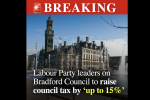MPs in areas with localised restrictions due to excessive Covid 19 cases will now be consulted on which areas will be included within the boundaries of the affected areas. This change is a result of lobbying from MPs including Robbie Moore whose Keighley and Ilkley constituency includes a number of towns and villages with no Covid cases at all.
In a Zoom call with Robbie, Health Secretary Matt Hancock said he wanted interventions to be ‘more targeted’. At present, council authorities have discretion over which geographical areas the restrictions apply. Today’s change means authorities must now seek a consensus with local MPs on the boundaries. The Joint Biosecurity Centre Gold meeting, chaired by the Secretary of State with the Chief Medical Officer, will then make the final decision based on the local recommendation, or if no consensus be reached, they will make the decision.
On July 30th additional restrictions were placed on residents in a number of northern council areas including the Bradford District. Thousands of residents have contacted Robbie about Bradford Council’s continuous recommendations to include the whole of the Keighley constituency within the restricted area. Many are frustrated by the ‘blanket’ policy approach in which the restrictions just follow the local authority boundary.
Many people in areas like Ilkley and Silsden, where the ‘R’ rate is significantly lower than other urban areas in the district feel their areas should be excluded from the additional restrictions. Some rural areas like the Worth Valley are also included in the restricted areas, despite having no recorded cases of Covid-19 at all.
Robbie has been making his views known for some time that a localised, geographical approach needs to be adopted which follows the data, rather than the current blanket policy. He said:
“At present, it is frustrating that Bradford Council’s recommendations to government seem to be opting for ease over logic, which is having a negative impact on tens of thousands of residents.
“Gyms remain closed, families are missing out on seeing loved ones and many businesses are losing out as people are staying at home, despite the area they’re in being no more at risk than other parts of the country.
“I’m glad the government have now asked local authorities to liaise with MP’s, so that all voices are taken into account when a recommendation is put forward, rather than sticking with the current approach with seems quite arbitrary. Placing restrictions on people is having a major impact on their daily lives, so these decisions should be based on data, rather than a broad-brush approach which just follows a local authority boundary.”
The government will expect councils to engage with MPs immediately and seek a consensus recommendation to the JBC Silver meeting chaired by the CMO on Wednesday, for a decision at the JBC Gold meeting on Thursday.
Health and Social Care Secretary Matt Hancock said:
“To prevent a second peak and keep COVID-19 under control, we need robust, targeted intervention where we see a spike in cases. The only way we can keep on top of this deadly virus is through decisive action led by the people who know their areas best, wherever possible through consensus with a local area.
"Our approach is to make the action we take as targeted as possible, with the maximum possible local consensus. To do that we are introducing a new process to increase engagement between local leaders, both councils and MPs, with the aim of taking as targeted action as possible.
"This will allow local councils to focus resources onto the wards which need more targeted intervention in order to drive infection rates down, and gives local people a stronger voice at the table.
"Remember, if you get any symptoms you can get a free test, and you must isolate if NHS Test and Trace tells you to.”
The following changes have been agreed with local leaders.

